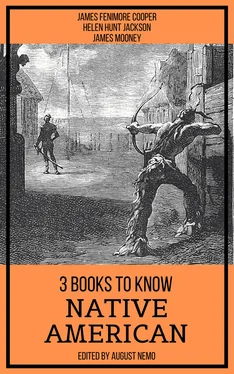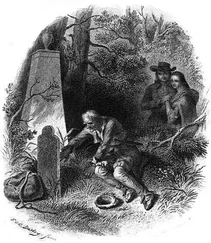But, while Duncan resorted to these words of consolation to quiet the apprehensions of the sisters, he was not so weak as to deceive himself. He well knew that the authority of an Indian chief was so little conventional, that it was oftener maintained by physical superiority than by any moral supremacy he might possess. The danger was, therefore, magnified exactly in proportion to the number of the savage spirits by which they were surrounded. The most positive mandate from him who seemed the acknowledged leader, was liable to be violated at each moment, by any rash hand that might choose to sacrifice a victim to the manes of some dead friend or relative. While, therefore, he sustained an outward appearance of calmness and fortitude, his heart leaped into his throat, whenever any of their fierce captors drew nearer than common to the helpless sisters, or fastened one of their sullen wandering looks on those fragile forms which were so little able to resist the slightest assault.
His apprehensions were, however, greatly relieved, when he saw that the leader had summoned his warriors to himself in council. Their deliberations were short, and it would seem, by the silence of most of the party, the decision unanimous. By the frequency with which the few speakers pointed in the direction of the encampment of Webb, it was apparent they dreaded the approach of danger from that quarter. This consideration probably hastened their determination, and quickened the subsequent movements.
During this short conference, Heyward, finding a respite from his greatest fears, had leisure to admire the cautious manner in which the Hurons had made their approaches, even after hostilities had ceased.
It has already been stated, that the upper half of the island was a naked rock, and destitute of any other defences than a few scattered logs of drift-wood. They had selected this point to make their descent, having borne the canoe through the wood around the cataract for that purpose. Placing their arms in the little vessel, a dozen men clinging to its sides had trusted themselves to the direction of the canoe, which was controlled by two of the most skilful warriors, in attitudes that enabled them to command a view of the dangerous passage. Favored by this arrangement, they touched the head of the island at that point which had proved so fatal to their first adventures, but with the advantages of superior numbers, and the possession of fire-arms. That such had been the manner of their descent was rendered quite apparent to Duncan; for they now bore the light bark from the upper end of the rock, and placed it in the water, near the mouth of the outer cavern. As soon as this change was made, the leader made signs to the prisoners to descend and enter.
As resistance was impossible, and remonstrance useless, Heyward set the example of submission, by leading the way into the canoe, where he was soon seated with the sisters, and the still wondering David. Notwithstanding the Hurons were necessarily ignorant of the little channels among the eddies and rapids of the stream, they knew the common signs of such a navigation too well to commit any material blunder. When the pilot chosen for the task of guiding the canoe had taken his station, the whole band plunged again into the river, the vessel glided down the current, and in a few moments the captives found themselves on the south bank of the stream, nearly opposite to the point where they had struck it the preceding evening.
Here was held another short but earnest consultation, during which the horses, to whose panic their owners ascribed their heaviest misfortune, were led from the cover of the woods, and brought to the sheltered spot. The band now divided. The great chief so often mentioned, mounting the charger of Heyward, led the way directly across the river, followed by most of his people, and disappeared in the woods, leaving the prisoners in charge of six savages, at whose head was Le Renard Subtil. Duncan witnessed all their movements with renewed uneasiness.
He had been fond of believing, from the uncommon forbearance of the savages, that he was reserved as a prisoner to be delivered to Montcalm. As the thoughts of those who are in misery seldom slumber, and the invention is never more lively than when it is stimulated by hope, however feeble and remote, he had even imagined that the parental feelings of Munro were to be made instrumental in seducing him from his duty to the king. For though the French commander bore a high character for courage and enterprise, he was also thought to be expert in those political practices, which do not always respect the nicer obligations of morality, and which so generally disgraced the European diplomacy of that period.
All those busy and ingenious speculations were now annihilated by the conduct of his captors. That portion of the band who had followed the huge warrior took the route towards the foot of the Horican, and no other expectation was left for himself and companions, than that they were to be retained as hopeless captives by their savage conquerors. Anxious to know the worst, and willing, in such an emergency, to try the potency of gold, he overcame his reluctance to speak to Magua. Addressing himself to his former guide, who had now assumed the authority and manner of one who was to direct the future movements of the party, he said, in tones as friendly and confiding as he could assume —
“I would speak to Magua, what is fit only for so great a chief to hear.”
The Indian turned his eyes on the young soldier scornfully, as he answered —
“Speak; trees have no ears!”
“But the red Hurons are not deaf; and counsel that is fit for the great men of a nation would make the young warriors drunk. If Magua will not listen, the officer of the king knows how to be silent.”
The savage spoke carelessly to his comrades, who were busied, after their awkward manner, in preparing the horses for the reception of the sisters, and moved a little to one side, whither, by a cautious gesture, he induced Heyward to follow.
“Now speak,” he said; “if the words are such as Magua should hear.”
“Le Renard Subtil has proved himself worthy of the honorable name given to him by his Canada fathers,” commenced Heyward; “I see his wisdom, and all that he has done for us, and shall remember it, when the hour to reward him arrives. Yes! Renard has proved that he is not only a great chief in council, but one who knows how to deceive his enemies!”
“What has Renard done?” coldly demanded the Indian.
“What! has he not seen that the woods were filled with outlying parties of the enemies, and that the Serpent could not steal through them without being seen? Then, did he not lose his path to blind the eyes of the Hurons? Did he not pretend to go back to his tribe, who had treated him ill, and driven him from their wigwams like a dog? And, when we saw what he wished to do, did we not aid him, by making a false face, that the Hurons might think the white man believed that his friend was his enemy? Is not all this true? And when Le Subtil had shut the eyes and stopped the ears of his nation by his wisdom, did they not forget that they had once done him wrong, and forced him to flee to the Mohawks? And did they not leave him on the south side of the river, with their prisoners, while they have gone foolishly on the north? Does not Renard mean to turn like a fox on his footsteps, and to carry to the rich and gray-headed Scotchman his daughters? Yes, Magua, I see it all, and I have already been thinking how so much wisdom and honesty should be repaid. First, the chief of William Henry will give as a great chief should for such a service. The medal 16 of Magua will no longer be of tin, but of beaten gold; his horn will run over with powder; dollars will be as plenty in his pouch as pebbles on the shore of Horican; and the deer will lick his hand, for they will know it to be vain to fly from the rifle he will carry! As for myself, I know not how to exceed the gratitude of the Scotchman, but I— yes, I will —”
Читать дальше












